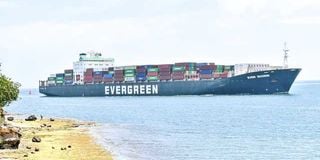Refueling of cargo vessels resume at Mombasa port, tax leaks sealed

A container vessel passes through the Kilindini harbour at the Port of Mombasa. Bunkering will resume this month at Mombasa Port.
Refueling of cargo vessels known in maritime terms as bunkering, will resume this month at Mombasa port after the Kenya Ports Authority (KPA) and the Kenya Revenue Authority (KRA) said they had sealed loopholes previously used to dodge taxes.
With resumption of the service after it was suspended about a decade ago, Kenya will now compete with Seychelles, which offers bunkering to all ships operating in the East and Horn of Africa.
Vessel operating Mombasa and Dar es Salam ports now will be saved from sailing all the way to fuel in Seychelles.
KRA and KPA boards of directors said cargo ships would no longer be re-routed to Seychelles to fuel and get other repair services.
“The boards have directed the two corporations to immediately undertake regular surveillance to ensure that this initiative is not abused. With the use of technology, we can verify quantity and quality of fuel dispatched and used in real-time,” read a joint communique signed by KPA chairman Benjamin Tayari and his KRA counterpart Anthony Mwaura.
During bunkering, barges carrying fuel will typically be moved alongside a vessel for refueling with the assistance of tugboats.
According to Seychelles Petroleum Company Ltd (SEYPEC), which provides bunkering to ships transiting the Indian Ocean, vessels offering services travel as far as 800 miles from port to reach ships to offer offshore bunkering within and outside the country’s economic exclusive zone.
Seychelles has four tankers - Seychelles Pioneer, Seychelles Progress, Seychelles Prelude, and Seychelles Patriot operating in international waters. In addition to supplying fuel to ships at anchor or on the high seas, it transports oil and liquefied petroleum gas (LPG) to the vessels.
In 2022, Seychelles' tanker fleet made a profit of $25 million for the year due to the rates that were brought about, unfortunately, by the Russian-Ukrainian war according to SEYPEC chief executive Sarah Romain.
In an earlier interview, KPA managing director William Ruto told a Parliamentary Committee on Regional Integration that the country is losing billions of shillings by not offering bunkering.
“We intend to do more of offshore bunkering since onshore service has turned out to be expensive due to the cost involved of storing fuel in tanks and reversing it back to ships which also include storage cost which is charged by Kenya Pipeline Company,” he said.
Mr Ruto said the service will not only attract more ships to dock at the port of Mombasa for fueling, but also increase transshipment volumes.
“Kenya has been offering fueling services to ships before but at the moment all ships operating in Kenya and Tanzanian ships have to sail to Seychelles to fuel thus making it costly for shipping lines to operate within the circuit and that is the reason we seek to be dominant in the major East African bunker market,” he said.
“A number of companies were suspended by the government about four years ago and since then, we have recorded a decline in a number of vessels calling at the port of Mombasa and now we only depend on cargo vessels,” he said.
According to KPA, services were suspended due to a lack of accountability as a result of a lack of capacity to monitor offshore bunkering business but with the new Integrated Surveillance Security System at the facility, KRA would be able to check activities beyond Kenya’s Economic Exclusive Zone.
Some of the private oil marketing companies that have been offering bunkering services in small quantities more so for emergency purposes at the port and offshore include Alba Petroleum, Alfoss Energy Limited (AEL), Gabco among other companies.





